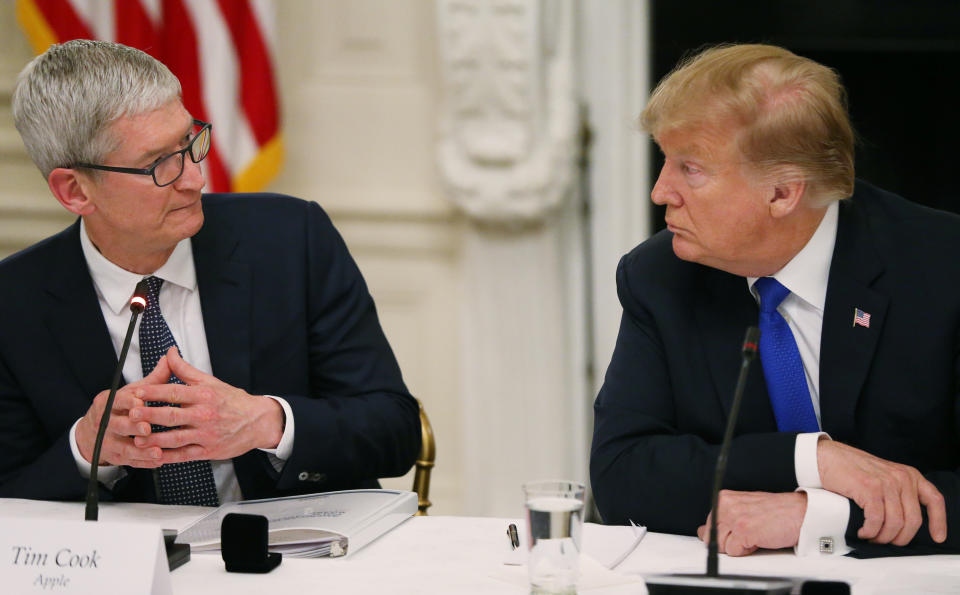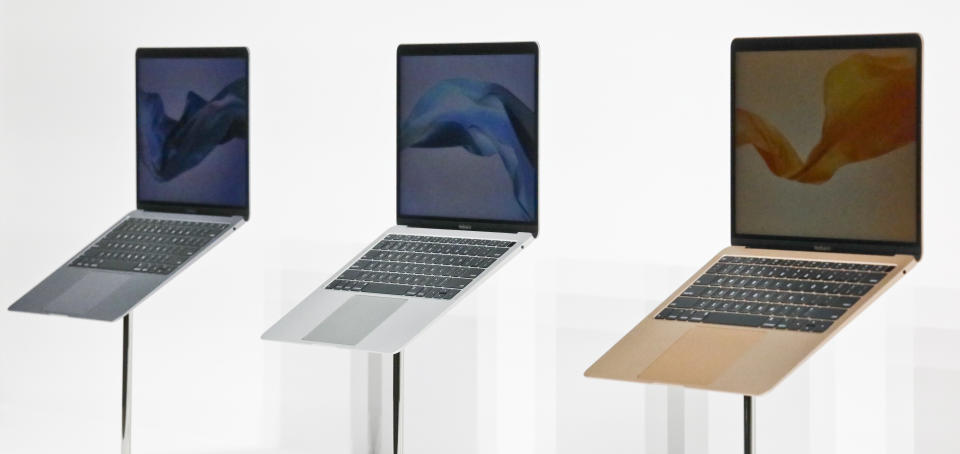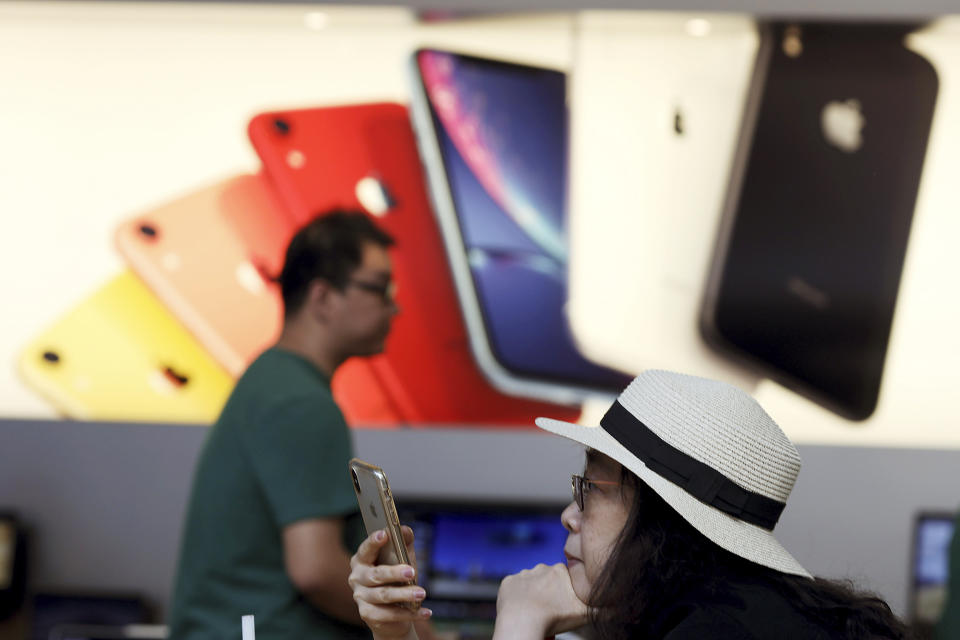How Trump’s tariffs could impact Apple iPhone, Watch prices
President Donald Trump met with Apple CEO Tim Cook on Sunday to discuss the potential impact tariffs would have on the U.S. tech giant. From the sound of it, Trump may be leaning toward providing Apple (AAPL) with some kind of exemption from the import tax, but there’s been no official word yet.
Those new 10% tariffs on various Chinese made goods imported to the U.S. could hit Apple at a time when smartphone sales continue to flatten and just as the company’s accessories, Mac and iPads, are on the rise. If those tariffs do go into effect, Apple could take a hit to its margins, or, in a less likely scenario, pass the added cost onto consumers.

Almost every Apple gadget could become pricier
Apple is looking at the possibility of being impacted by the 10% tariff, regardless of when it goes into effect. Last week, Trump delayed tariffs on some consumer goods. But the tariffs scheduled to go into effect on September 1 would hit products including the company’s smash hit accessories, including AirPods and Apple Watch.
In mid-December Apple’s iPhones, laptops, desktops and iPads will be hit with the same 10% tax that landed on AirPods and Apple Watches just a few months earlier. That’s a significant chunk of the company’s business.
If Apple ends up passing the price of those tariffs onto consumers, the cost of products would increase by 10%. For something like the AirPods with wireless charging pod, which start at $199, the cost would increase by $19.90, bringing the price to $218.90.
The Apple Watch Series 4 40mm model, which starts at $399, the 10% tariff would add $39.90 to its cost, pushing its price up to $438.90. The $399 44mm model Apple Watch Series 4 would jump by $42.90, increasing the price to $471.90.

Those increases aren’t as significant as they might seem, especially when you’re already spending a few hundred dollars on a new Apple Watch. But the tariffs would add a good amount to the price of more expensive products like the iPhone and MacBook.
Take the iPhone XS Max, which starts at $1,099. A 10% tariff adds an additional $109.90 to the price of the smartphone, bringing the total cost to $1,208.90. The price of the entry-level iPhone XR, which starts at $749, would jump by $74.90 to $823.90.
Then there’s Apple’s MacBook laptops, which start at $1,099, and would reach $1,280.90 with the tariffs adding $109.90.
Apple could eat the tariffs
So, will Apple pass the cost of tariffs on to consumers? According to UBS analyst Timothy Arcuri, it’s unlikely. In an analyst note, Arcuri explained, “Apple would likely absorb the initial 10% tariff increase putting pressure on margin, though FX could be slight offset.”
Gartner vice president and research analyst Annette Zimmermann agrees with that assessment saying that Apple will likely take on the 10% tariff itself. But anything higher could be passed to consumers at some point.
“Of course, we don’t know for certain what Apple is going to do—the 10% tax that is coming now in September for its wearables and Home Pod might get absorbed by Apple and not passed on to the consumer,” she explained via email.
“However, there are scenarios where a 25% tax is discussed coming in December—in that case it is more likely that Apple passes on the taxes at least partially to consumers,” Zimmermann added.
Tariffs could put a damper on 5G iPhone launch
IDC analyst Tom Mainelli, however, says that it depends on when the tariffs take hold, and how long they are in effect. If Trump keeps the 10% tariffs running well into 2020, when Apple is expected to launch its 5G iPhone, Apple might have to pass the tax onto consumers due to that phone’s increased development cost.
“I would imagine that they would not completely swallow the 10%,” Mainelli explained. “A lot of it is going to depend, obviously, when it hits. And if it hits as they head into 2020, as we expect it to, and it impacts what we expect will be the first 5G phones from Apple...margins would be pressured more in the year when they are flipping the switch to 5G.”

So, what does that mean for consumer demand for Apple’s products in the near term? According to Arcuri, not much. UBS’s monthly data points to increased iPhone demand in China. In July Apple gained market share.
“On a Q/Q basis, Apple seems to have gained share with growth of 26% compared to a decline of 1% for the smartphone market,” Arcuri wrote in his note.
While much has been made about a global slowdown in smartphone sales, Apple has been increasingly seeing improvements across its various business segments including accessories, iPad, MacBook, and services.
The company is expected to debut its next iPhone and Apple Watch models in September, with its Apple TV+ streaming service reportedly set to launch in November for $9.99 a month after a free trial period, according to Bloomberg. But like its other products, Apple’s Apple TV streaming box would also be impacted by the 10% tariffs.
Apple TV+, however, will have to compete with the likes of Netflix (NFLX), Hulu, Amazon (AMZN) Prime Video, and Disney’s new Disney+ service, which will be available for $6.99 a month and include everything from the Disney vault, to “Star Wars,” Marvel cinematic universe and “The Simpsons.”
But Apple has managed to beat back the competition before. When its Apple Music service initially launched, many industry experts questioned whether it could compete with established players like Spotify (SPOT) . Since then, however, Apple Music has managed to surpass Spotify in terms of paying listeners in the U.S., according to The Wall Street Journal.
We’ll have to wait until September 1 arrives and the tariffs are in effect before we know how much of an impact they’ll have on Apple. Until then, the company will have to wait for word on any potential exemptions from the government.
More from Dan:
Email Daniel Howley at dhowley@yahoofinance.com; follow him on Twitter at @DanielHowley.
Follow Yahoo Finance on Twitter, Facebook, Instagram, Flipboard, SmartNews, LinkedIn,YouTube, and reddit.

